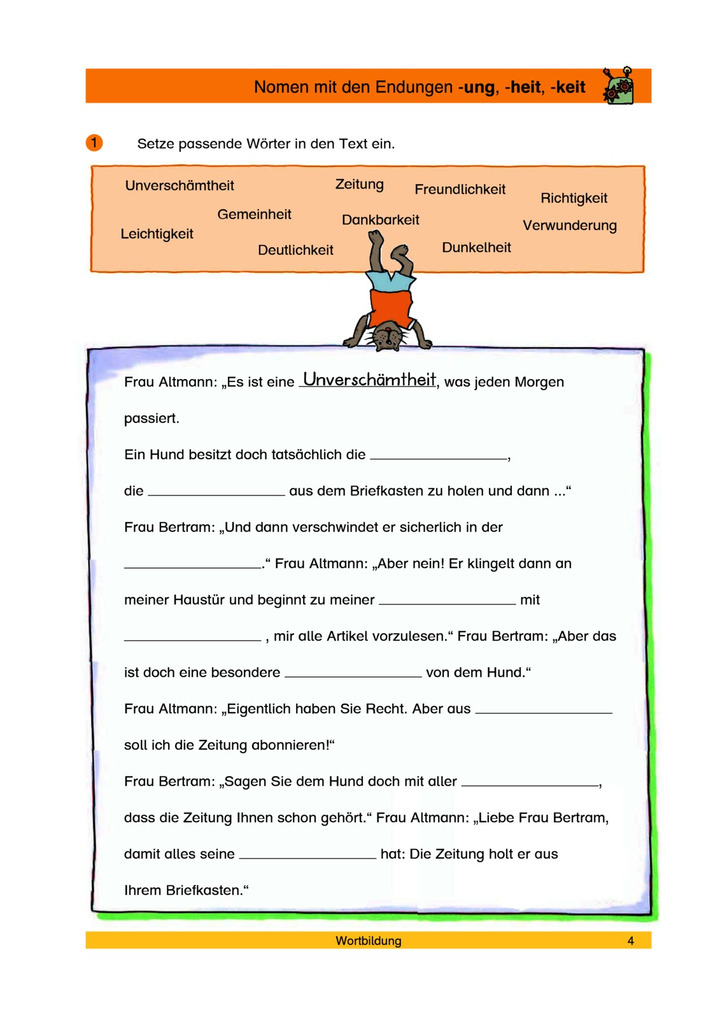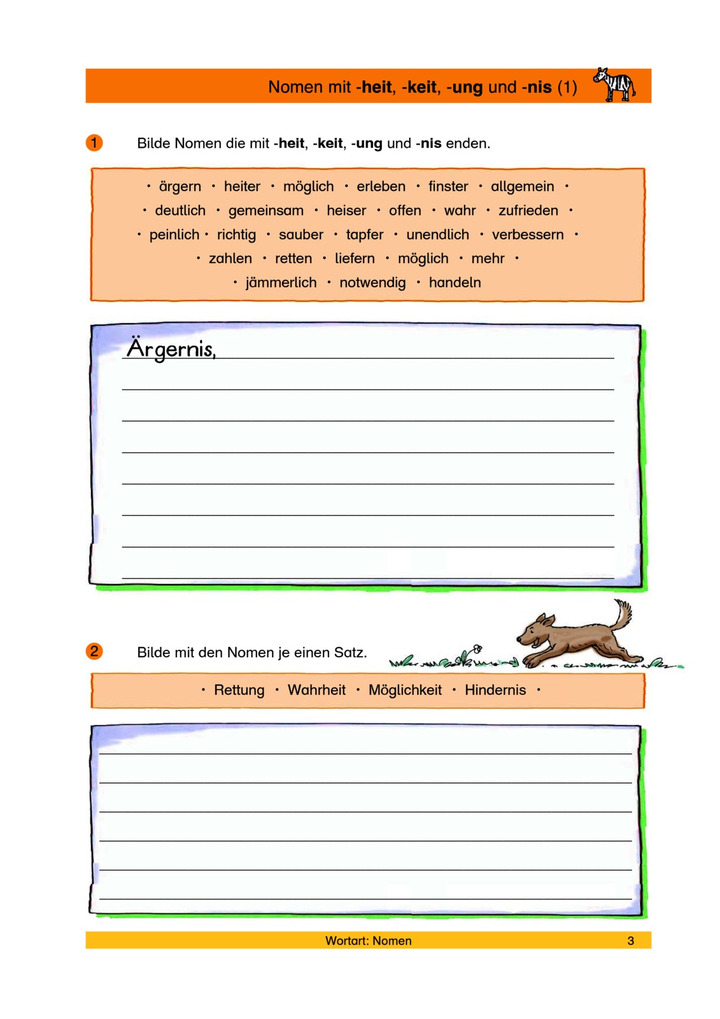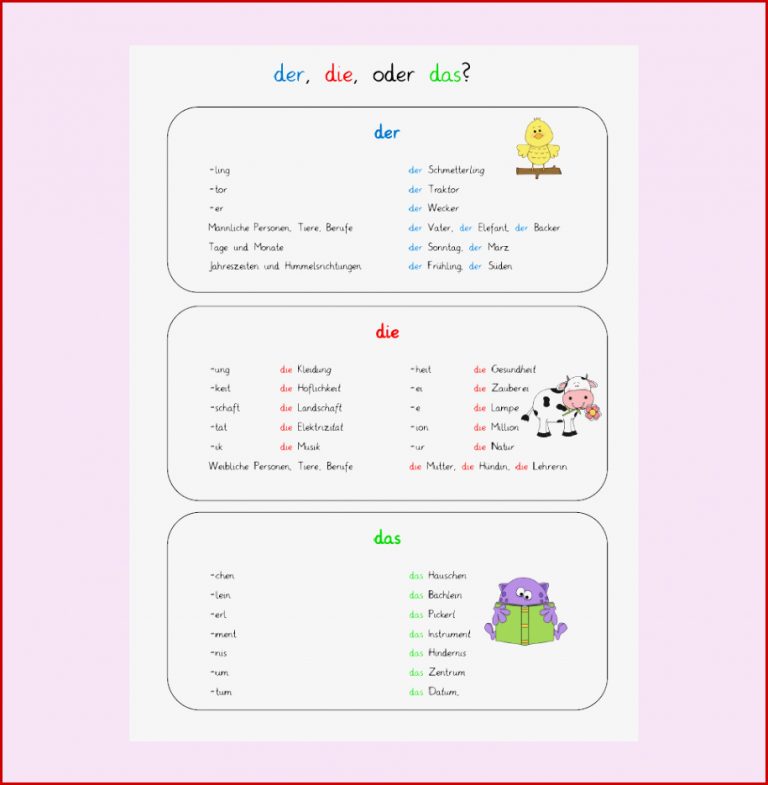
Die Suffixe ungheitkeitschaft الوحدة 3 الدرس5 YouTube
Nomen schreibst du groß, das ist klar! Du kennst sicher auch viele Nomen. In diesem Video lernst du Tipps kennen, wie du vor allem abstrakte Begriffe als Nom.

Nomen mit den Endungen ung, heit, keit Lückentext Verlage der Westermann Gruppe
When the first noun ends in either -heit, keit, -ung Die Gesundheitswerbung / the health ad-s- For some nouns that end in -s- in the genitive case. Das Säuglingsgeschrei / the newborn's cry (des Säuglings) In verbstem + noun compositions, you add: -e-After many verbs that have a stem ending b, d, g, and t. Der Liegestuhl / the lounge chair

Lernstübchen Nomen mit dem Wortbaustein heit
Noun Plurals in English. Most English plurals are formed simply by sticking an -s or, for purposes of pronunciation, an -es onto the end of the singular: cow → cows; kiss → kisses.. There are some exceptions:. When some nouns that end in -f (a voiceless fricative) are made plural, that consonant becomes voiced before the plural suffix -s (or -es) is added: calf → calves; half → halves.

Pin auf Deutsch Grundschule Unterrichtsmaterialien
If you remove the suffix (ending) "-heit(en)" or, respectively "-keit(en)" from these nouns, you always receive the suiting adjective that refers to this noun. For example: frei - die Freiheit (free - freedom) gesund - die Gesundheit (healthy - health) einsam - die Einsamkeit (lonely - loneliness)

Schulmaterial Arbeitsblätter für die Unterstufe
In practice, you needn't worry about these. There is no difference in meaning between -heit and -keit (we will see later when to use which); -heit and -keit most commonly correspond to the English suffix -ness, as in: einsam (lonely) — Einsamkeit (loneliness) krank (ill) — Krankheit (illness)

Großschreibung beiungheitkeit (Kreuzworträtsel) Unterrichtsmaterial im Fach
LEO.org: Your online dictionary for English-German translations. Offering forums, vocabulary trainer and language courses. Also available as App!

DateiNomen mit heit, keit, ung.jpg ZUM Grundschullernportal
-ung, -heit, -keit, -schaft, -ion, and -tät. These are all feminine endings, which are pluralized by -en. Diskussion(en) Discussion(s) Universtät(en) University(ies)-unft. This ending is feminine and is pluralized by changing the stem vowel and adding -e. Unterkunft; Lodging. Unterkünfte; Lodgings-ik. This ending often doesn't have a plural.

Nomen/ Substantive auf heit, keit, ung & nis Deutsch Klasse 35 Homeschooling
Mit den Endungen - heit, -keit, -nis und -ung lassen sich aus Verben und Adjektiven abstrakte Nomen bilden. Wenn du wissen möchtest, worauf du achten musst,.

Nomen mit heit, keit, nis, ung das solltest du wissen YouTube
1. Deriving Nouns from Adjectives To make word formation, we put suffixes like -heit / -keit at the end of the adjectives. Adjektiv + heit / keit For example, frei is an adjective meaning.

Nomen mit den Endungen heit, keit, ung, nis Nomen bilden Verlage der Westermann Gruppe
feminine nouns with the endings -e, -in, -ion, -ik, -heit, -keit, -schaft, -tät, -ung Example: die Nation - die Nationen the nation - the nations. in the case of feminine nouns that end in -in, the n is doubled. die Lehrerin - die Lehrerinnen the teacher - the teachers; the endings -ma, -um, -us in foreign words are usually replaced by.

Deutsch 28 . April 2020 Nomen mit den Endungen nis, heit, keit und ung YouTube
You'll keep seeing or hearing certain examples over and over again. With time, you'll start to apply them automatically also for speaking. 1. Diminutive nouns with the ending -chen or -lein are neuter: Note: in some cases, the stem vowel becomes an umlaut. 2. Nouns ending in -heit, -keit, -ung are always feminine.

Heit Keit Ung Nis Schaft Tum Arbeitsblätter 1 Ideen Sie Berücksichtigen Müssen Kostenlose
Converts an adjective into a noun and usually denotes an abstract quality of the adjectival root. It is often equivalent to the English suffixes -ness, -th, -ty: schön ("beautiful") + -heit → Schönheit ("beauty") neu ("new") + -heit → Neuheit ("novelty") Converts concrete nouns into abstract nouns:

Deutsch lernen, der die das, Endungen, wann sagt man der die oder das?, Nomenendungen, heit keit
N-noun: A masculine or neuter noun with genitive singular and nominative plural ending in - (e)n is called an n-noun or weak noun (German: schwaches Substantiv ). Sometimes these terms are extended to feminine nouns with genitive singular and nominative plural -en .

ung, heit & keit …. ein Nomen steht bereit“ MontessoriSchuleGreifswald
Noun suffixes: rules for "die" Nouns ending in:-ung -heit, -keit, -schaft, - (t)ion, -ur, -tät, -ei, -ie, -in, -ine, and -ik are always female and have "die" as an article. German English die Musik the music die Lektion the lesson die Werbung the ad die Freiheit the freedom die Mannschaft the team

Pluralbildungen von Nomen / Substantiven auf heit, keit, ung, nis Homeschooling
All feminine nouns ending in -ei, -heit, -keit, -schaft, -ung have the plural suffix -en: die Bäckerei > die Bäckereien - the bakeries; die Freundschaft > die Freundschaften - the friendships;

Arbeitsblätter Wörter mit der Endung ung, nis, heit, keit Wörter, Schreibschrift
Freundschaft - friendship; derived from the noun Freund. Heiterkeit - cheerfulness; derived from the adjective heiter. Umleitung - deviation; derived from the verb umleiten. The suffix -ung is normally used with verbs, -heit or -keit with adjectives and -schaft with nouns. But you still have to learn each word constructed in this way separately.